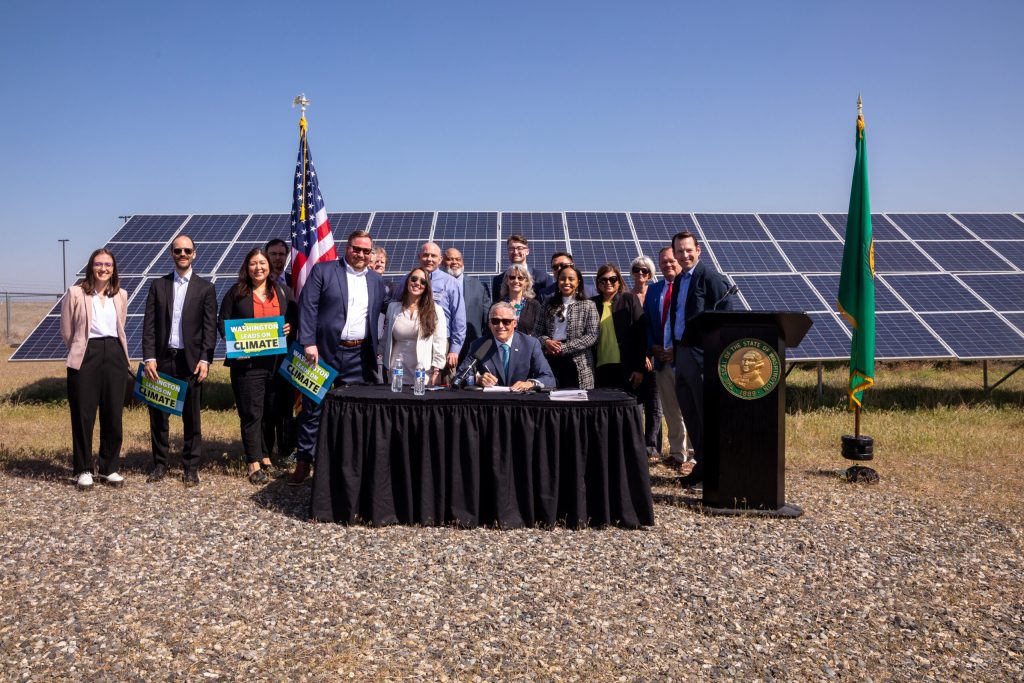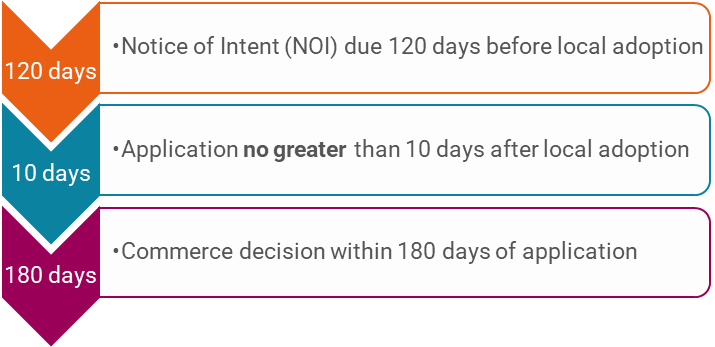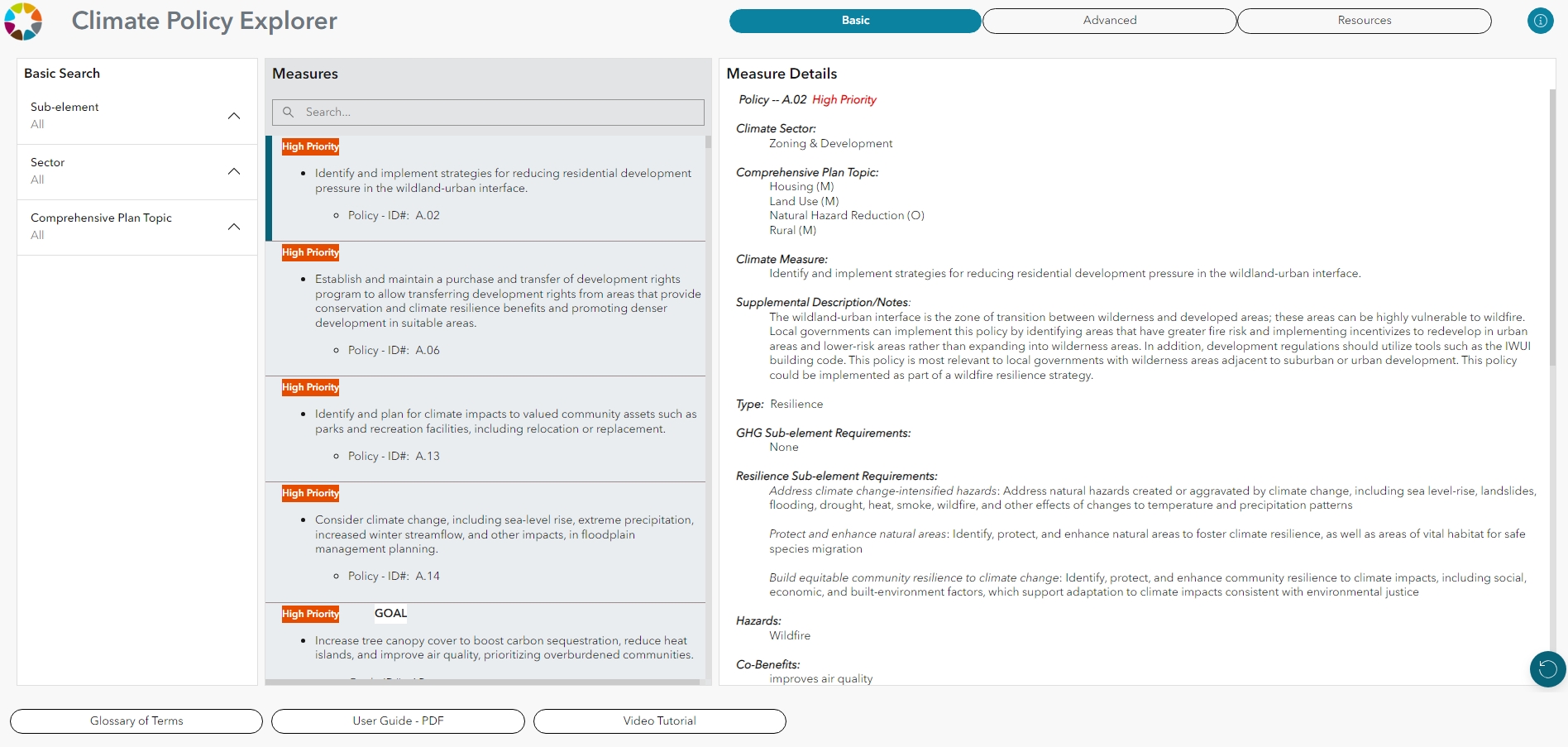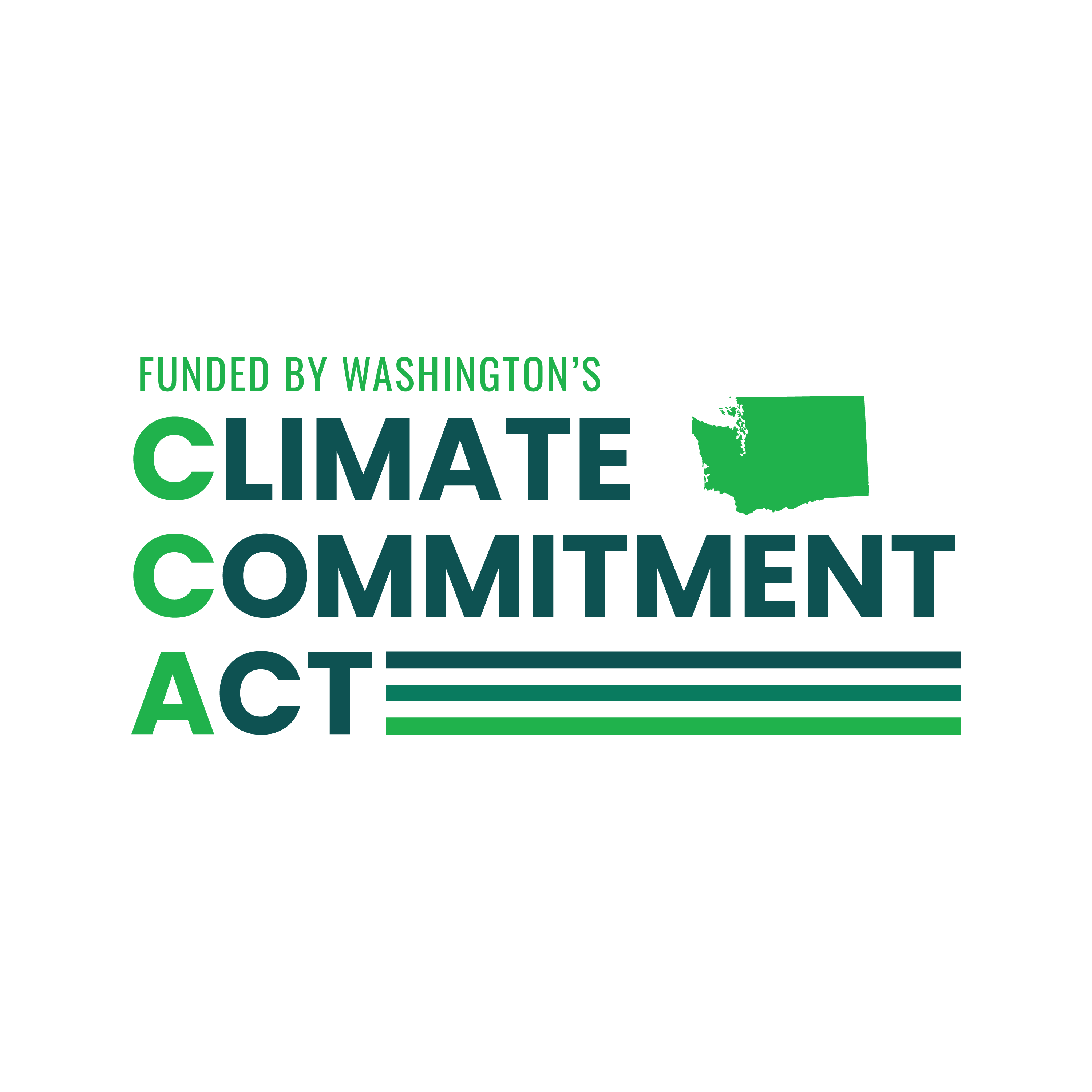Cities and counties planning under the Growth Management Act must have a climate element as part of their comprehensive plan. This page provides information on planning guidance, grants and other resources for developing a climate element that mitigates greenhouse gas emissions and builds community resilience.

Planning for climate change
Legislation signed into law in 2023 (HB1181) added a climate goal to the Growth Management Act (GMA) and requires local comprehensive plans to have a climate element. Climate elements must maximize economic, environmental, and social co-benefits and prioritize environmental justice in order to avoid worsening environmental health disparities. A climate element can take the form of a single comprehensive plan chapter or be integrated into several chapters/elements such as housing, transportation, and land use.
Intermediate guidance
Commerce has prepared intermediate climate element planning guidance and a list of more than 200 model climate goals and policies that jurisdictions can integrate into their comprehensive plans.
Cities and counties with a 2025 comprehensive plan periodic update deadline will be the first cities required to have a climate element and should use the intermediate guidance.
- Intermediate guidance – Updated Jan. 2024 (PDF)
- Intermediate guidance Overview (PDF)
- Intermediate guidance FAQ (PDF)
Translated versions
- Khmer (Cambodian)
- Chinese (Simplified/Mainland China)
- Korean
- Pashto
- Vietnamese
- Spanish
- Nepali
- Farsi (Persian)
Appendices
- Climate Justice (PDF)
- Climate Element Workbook (Excel)
- Best Practices for Integrating Climate into a Hazard Mitigation Plan (PDF)
- Crosswalk Comparison of FEMA/Commerce Guidance (Excel)
- Sample RFP for GHG Inventory (PDF)
- Summary Report: Climate Resilience Pilot Program (PDF)
- Guiding Principles for Climate Planning (PDF)
- Multi-criteria Analysis Examples (PDF)
- Handbook for Analyzing GHG Reductions (PDF)
- Glossary (PDF)
- Menu of Measures (Excel)
- Climate Change Resources (Excel)
- Greenhouse Gas Emissions Reduction Survey of Small and Mid-sized Cities results (PDF)
Jurisdictions planning under the Growth Management Act must add a climate element to their comprehensive plans in a timeframe based on the periodic update schedule.
A resilience sub-element is mandatory for all fully planning counties and cities under the GMA and is encouraged for all other counties and cities.
A greenhouse gas emissions reduction sub-element is mandatory only for the following 11 counties (and their cities with a population greater that 6,000 as of April 1, 2021):
- Benton
- Clark
- Franklin
- King
- Kitsap
- Pierce
- Skagit
- Snohomish
- Spokane
- Thurston
- Whatcom
Jurisdictions that are required to complete a greenhouse gas (GHG) emissions reduction sub-element per RCW 36.70A.095 may voluntarily request Commerce approval of their sub-element. If Commerce approves the submitted sub-element, Commerce would then defend its decision before the state’s Growth Management Hearings Board, should the sub-element be appealed.
RCW 36.70A.096 requires jurisdictions seeking approval of their sub-element to provide a written notice of intent (NOI) to apply 120 days prior to local adoption. Jurisdictions will then submit their application for approval to Commerce within 10-days after local adoption. Commerce shall strive to approve or deny an application within 180 days of the date of receipt of the application.

If you are interested in getting your GHG reduction sub-element approved, please email gmsclimate@commerce.wa.gov.
Climate policy explorer

Use the Climate Policy Explorer to search more than 200 model climate measures and more than a 100 planning resources using multiple criteria.
Refer to the climate policy explorer user guide (PDF) to learn how to use the Climate Policy Explorer.
Climate planning grants
Commerce administers climate planning grants to assist cities and counties across Washington to prepare for the impacts of climate change. Approximately $30 million was available in statewide grants for the 2023-2025 biennium. For information about climate planning grants for the 2025-2027 biennium please visit the GMA Grants webpage or contact gmsclimate@commerce.wa.gov.
Where did funding go?
Commerce made approximately $30 million available in statewide grants for the 2023-2025 biennium. The below map shows jurisdictions with a contract for a climate planning grant. This map provides more detail, including grant work plans. A list of grant recipients is provided in the dropdown below.
Counties
Benton County: $800,000
Chelan County: $300,000
Clallam County: $300,000
Clark County: $800,000.00
Franklin County: $800,000
Grant County: $300,000
Island County: $300,000
Jefferson County: $300,000
King County: $800,000
Kittitas County: $300,000
Lewis County: $300,000
Mason County: $300,000
Pierce County: $800,000
San Juan County: $300,000
Skagit County: $800,000
Spokane County: $800,000
Thurston County: $800,000
Whatcom County: $800,000
Cities
Blaine: $100,000
Sumas: $100,000
Nooksack: $100,000
Bellingham: $700,000
Friday Harbor: $100,000
Concrete: $100,000
Hamilton: $100,000
Sedro-Woolley: $500,000
Coupeville: $100,000
Port Angeles: $150,000
Port Townsend: $150,000
Sequim: $150,000
Langley: $100,000
Forks: $100,000
Chelan: $100,000
Spokane Valley: $700,000
Liberty Lake: $500,000
Millwood: $100,000
Entiat: $100,000
Cashmere: $100,000
Spangle: $100,000
Wenatchee: $150,000
Shelton: $150,000
Edgewood: $500,000
Roslyn: $100,000
South Cle Elum: $100,000
Tumwater: $500,000
Kittitas: $100,000
Tenino: $100,000
Raymond: $100,000
Mattawa: $100,000
Naches: $100,000
Tieton: $100,000
Selah: $150,000
Napavine: $100,000
Yakima: $242,500
Union Gap: $150,000
Moxee: $100,000
Mossyrock: $100,000
Winlock: $100,000
Wapato: $100,000
Vader: $100,000
Zillah: $100,000
Harrah: $100,000
Toppenish: $150,000
Pasco: $700,000
Benton City: $100,000
Walla Walla: $150,000
Yacolt: $100,000
Battle Ground: $500,000
Vancouver: $700,000
Camas: $500,000
Washougal: $500,000
South Bend: $100,000
Ferndale: $500,000
Lynden: $500,000
Everson: $100,000
Anacortes: $500,000
La Conner: $100,000
Burlington: $500,000
Lyman: $100,000
Bothell: $500,000
Kenmore: $500,000
Redmond: $700,000
Yarrow Point: $100,000
Issaquah: $500,000
Carnation: $100,000
Snoqualmie: $500,000
Seattle $700,000
Federal Way: $700,000
Auburn: $700,000.00
Covington: $500,000
Maple Valley: $500,000
Tacoma: $700,000
Sumner: $500,000
Lakewood: $700,000
Fircrest: $500,000
Gig Harbor: $500,000
La Center: $100,000
Deer Park: $100,000
Spokane: $700,000
Airway Heights: $500,000
Medical Lake: $100,000
Cheney: $500,000
Rockford: $100,000
Fairfield: $100,000
Waverly: $100,000
Latah: $100,000
Prosser: $500,000
Richland: $700,000
Kennewick: $700,000
Centralia: $150,000
Mercer Island: $500,000
West Richland: $500,000
East Wenatchee: $150,000
Mukilteo: $500,000
Bucoda: $100,000
Lake Forest Park: $500,000
Lacey: $700,000
Grandview: $150,000
Mabton: $100,000
Sunnyside: $150,000
Bellevue: $700,000
Renton: $700,000
Yelm: $500,000
Olympia: $700,000
Granger: $100,000
Cle Elum: $100,000
Ridgefield: $500,000
Oak Harbor: $150,000
Commerce will be updating the Washington Administrative Code to provide guidance that cities and counties can use when developing comprehensive plan updates and describe new regulatory authority by which Commerce will review and approve city and county climate elements submitted as part of comprehensive plan updates. Please see the following link to our rulemaking page to review the CR-101 notice.
Climate support from Commerce is provided with funding from Washington’s Climate Commitment Act. The CCA supports Washington’s climate action efforts by putting cap-and-invest dollars to work reducing climate pollution, creating jobs, and improving public health. Information about the CCA is available at www.climate.wa.gov.

